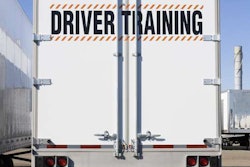
President Trump in his second full week in office continues his crusade against new and existing federal regulations. Trump signed an executive order Monday directing federal agencies to eliminate two “prior regulations” for “every new regulation issued.”
Specifically, federal agencies — like the Federal Motor Carrier Safety Administration — will need to “identify at least two existing regulations to be repealed” whenever they propose a new regulation in the Federal Register. The order also says any new regulations finalized in 2017 should come with no costs — “no greater than zero,” the order notes. The White House will set a new regulatory costs limit each year, for which new regulations should not exceed, per the Jan. 30-issued order.
Trump said the move was intended to ease the regulatory burden on small businesses. He was surrounded by nine small business owners when he signed the order.
This is the second major order on federal regulations Trump has issued since assuming the presidency Jan. 20. He signed the day he took office an order barring agencies from issue any new regulations and put a 60-day hold on regulations published but not enacted. The only trucking regulation seemingly affected by the first order was a December-published rule establishing national training standards for new truck drivers.
The American Trucking Associations says it’s still unclear how the move will affect trucking regulations. The group said it is a “useful exercise” to occasionally review regulations to ensure they’re still relevant and applicable to the industry, but it cautioned against blind revocation of regulations.
“We believe regulators and policymakers must be judicious in eliminating or reversing regulations so that they do not unduly upset the plans of businesses that have implemented and abided by these rules,” says Bill Sullivan, ATA’s executive vice president of advocacy.
Todd Spencer, executive vice president of the Owner-Operator Independent Drivers Association, said he’d like to see the Compliance Safety Accountability program, FMCSA’s carrier rating/compliance system, reviewed as a possible regulation to repeal as part of the White House’s new initiatives.
“Review of the CSA program is a good illustration in how much of what is enforced is not related to crashes. But disproportionately large focus stays there. If their isn’t a safety tie then resources should go somewhere else or be eliminated. Maybe money is better spent on infrastructure including parking than enforcement on trucks,” he said.
Critics of the order argue it will create scenarios in which federal agencies must choose between two consumer- and public-protecting regulations.
Some have also questioned the logistics of the two in, one out policy. federal law could require a public notice and comment period for regulations being repealed, which will make the process stickier than simply nixing regulations at agencies’ whims. The definition of “one regulation” also isn’t clear in Trump’s order.













